Caffeine supplements are supplements frequently made from a natural caffeine source often taken to provide energy and focus. Caffeine is a substance that is found in coffee beans and tea leaves.
It stimulates the central nervous system, which is why many individuals use caffeine to wake up first thing in the morning.
Best Caffeine
1. Performance Lab Stim
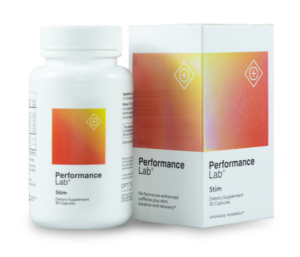
Performance Lab Stim is our number one caffeine supplement recommendation. The capsules are vegan friendly and are made from prebiotic fiber, which help to support a healthy digestive system. Performance Lab also includes L-theanine along side caffeine in the scientifically proven 2:1 ratio to enhance energy and focus, while minimizing jittery side effects.
Additionally, it’s also packed with B-vitamins and L-tyrosine to further enhance the benefits of caffeine.
2. The Genius Brand Genius Caffeine Extended Release Caffeine
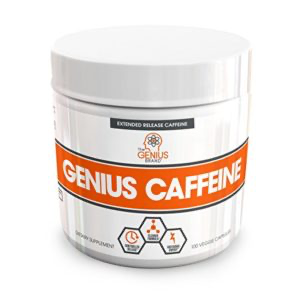
The Genius Brand, provides a unique caffeine supplement that provides sustained release caffeine, which means that you can depend on it to work throughout the day. Their patented time release caffeine newcaff, is a type of caffeine that has been studied extensively in clinical trials after tons of research was conducted on the substance itself.
It can delay the speed that caffeine is usually absorbed into your body, providing enough energy to keep you alert and focused without the jitters and crashes. Genius Caffeine is made with veggie capsules and it does not contain any fillers, dyes, or additives.
3. Smarter Vitamins Caffeine + MACA Energy Pills
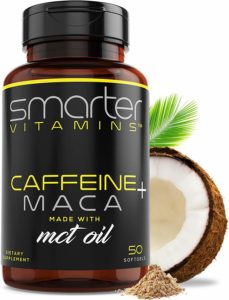
Smarter Vitamins Caffeine + Maca pills are certified gluten-free and combine the benefits of caffeine with organic MACA root for a great energy boost. The USDA certified organic MACA root is a great way to improve your mood this form has been gelatinized to increase bioavailability.
This product does not contain any fillers, preservatives, dioxides, magnesium iterate, silica, maltodextrin, or artificial colors and flavors. They are sugar free, peanut free, and sodium free and contain no lactose or milk, no soy, and no corn or palm oils.
4. Natrol High Caffeine Energy Support
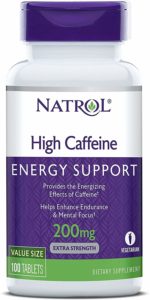
Natrol’s caffeine supplement is vegetarian friendly and helps to boost your body’s natural energy through a caffeine surge. It can also delay the onset of fatigue when you’re exhausted.
The company utilizes a scientific advisory board that all have a Ph.D. in various fields, including neuroscience, psychiatry, and other areas. This ensures that everything the company does is based on science and created through scientific approach and study.
5. Nutricost Caffeine
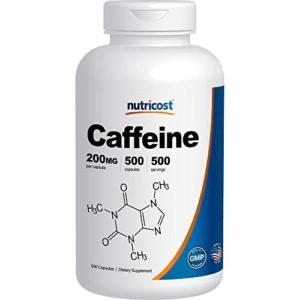
Nutricost caffeine pills are a great option because, without the sugar, gluten, and calories, they’re safe for most dietary restrictions.
Nutricost caffeine pills are gluten free and non-GMO. They comply with GMP (Good Manufacturing Practice standards while being packaged and manufactured in an FDA registered facility. They are third party tested for quality and purity and backed by a guarantee.
6. Nutra Champs Focused Energy
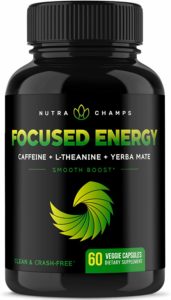
Nutra Champs Focused Energy supplements are made in the USA and are vegan friendly. They’ve got a combination of 3 different energy forms, combining caffeine, L-theanine, and yerba mate to prevent jitters and crashes while providing a strong cognitive boost.
The energy it delivers is designed to slowly taper out, which will prevent crashes and fatigue.
7. ProLab Caffeine Tablets

ProLab caffeine tablets are a great and very popular option. They contain no yeast, wheat, gluten, corn, milk, eggs, soy, artificial flavoring and coloring, added sugar, starch, or preservatives.
This product will improve your performance and energy, getting you through those afternoon slumps, training sessions, marathon study sessions, and hit the snooze mornings.
8. Motivation Herbal Caffeine and Energy Pills
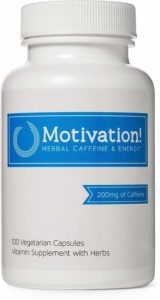
Motivation takes vegetarian capsules and fills them with caffeine and a B vitamin complex of guarana seed, green tea extract, Rhodiola, and ginseng for a great boost of powerful energy and focus. Each supplement has a 100% RDA (recommended daily allowance) dose of the complete B vitamin complex along with the caffeine, to help your metabolism as well as your energy.
The pills are manufactured in the USA. They are made in a GMP (good manufacturing practices) facility that is certified and inspected by the FDA. They have received an A rating from multiple independent authorities.
9. Vital Fuse Fused Focus Energy and Clarity Caffeine Pills

Vital Fuse Fused Focus energy pills are non-GMO. They mix caffeine with ginkgo Biloba for natural amino energy that helps your brain focus. They are made in the USA. follow GMP regulations and are trusted by athletes.
These supplements also include teacrine, which is a natural stimulant that boosts your energy while improving your focus.
10. Firebred Nutrition Elevation Caffeine Pills
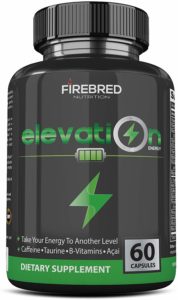
This caffeine supplement combines the natural powers of caffeine, taurine, B vitamins, and acai for a complete energy boost from natural sources.
It’s also got ginseng and Rhodiola Rosea to help decrease any fatigue in your cognitive cortex and burn stored fat for energy and fuel.
How We Rank
The first thing we looked at, when ranking the best caffeine, was the purity of the ingredients. We preferred companies, like Smarter Vitamins and Performance Labs Stim that use organic natural ingredients. All of the supplements on our list are free of additives, binders and fillers to ensure purity. We also rewarded products like Vital Fuse that used natural sources of caffeine.
Next, we looked at the dosage in each caffeine supplement. Having too much caffeine will cause you to be very jittery and cause others side effects that will start to cancel out at any benefits you might’ve received. According to various scientific literature, 1-3mg of caffeine is needed per 1kg of body mass. For simple math, 100mg is the low dose for a 100lb person. As such, any product with less than 100mg was eliminated. Companies, like The Genius Brand, ranked high because they offered extended-release options so you get the right amount of caffeine at the right time instead of having it all absorbed at once and ending up tired again later.
Thirdly, we looked at complementary ingredients. Caffeine can cause jittery side effects and there are certain ingredients that can help combat this. One of them is L-theanine. Combined with caffeine, L-theanine helps to provide jitter free energy while improving the effects of caffeine. Companies like Nutra Champs and Performance Lab Stim ranked highly as a result.
Lastly, we looked at the company’s history. We wanted to make sure that the company could be trusted. After all, it doesn’t matter how good the source ingredients are if the manufacturing process denigrates the final product so much that it’s worthless. Longer standing companies, with a good reputation, like Natrol (which is almost 50 years old) were preferred.
Benefits
1. Caffeine may reduce depression. In a 2016 study, researchers explored the consumption of coffee, caffeine, and tea. Over 8000 cases of depression were observed and examined. Researchers concluded the study by stating that caffeine may have protective effects against mental illnesses, particularly depression (1).
A 2011 study also backed these conclusions. Researchers gathered information from participants over the course of 10 years and found that depression risk decreased with caffeine consumption (2).
2. Caffeine supplements may boost metabolism. A 2007 study involved 31 male and female subjects and caffeine’s effect on their metabolic function. It was found that caffeine increased energy expenditure in the subjects in the study by almost 5%. However, researchers also noted that weight maintenance and weight loss should also involve a healthy diet and physical activity (3).
3. Caffeine supplements may improve exercise performance. A 2013 study demonstrated a higher power and performance in the caffeinated group when compared to a non-caffeinated group (4).
An older study also showed similar results. 9 athletes participated in the study and performed cycling until exhaustion once without taking caffeine and once after caffeine consumption. It was shown by biological markers that lipid metabolism was greater in the caffeine trial. The athletes also performed better in the caffeine-induced trial (5).
In 2010, researchers reviewed a wide array of studies which, again, displayed similar results and conclusions. Significant improvements were found in participants and their exercise performance following caffeine consumption (6).
4. Caffeine supplements and consumption may reduce headaches. One study determined the effectiveness of combining acetaminophen, aspirin, and caffeine when it came to relieving migraine headache pain. Pain intensity was reduced in participants 1-6 hours after the combined consumption. Researchers concluded that this combination may aid in reducing headaches and serve as a treatment for migraines (7).
Other reviews and studies have noted the analgesic effect of caffeine to be equal to that of acetaminophen and that it further had positive effects on an individual’s mood (8).
5. Caffeine consumptions increases alertness, which coincides with other benefits of it, such as the aforementioned improved exercise performance. Studies have shown that caffeine groups tend to be more alert and less fatigued than non-caffeinated groups (9).
An older 1993 study went even further, exploring caffeine and its effects on sleep-deprived individuals. 50 males participated in the study. After 49 hours without sleep, the subjects received caffeine. It was found that the caffeine reduced sleep deprivation changes, including fatigue, vigor, and confusion, even bringing them back to normal resting levels. Researchers concluded that caffeine had the potential to increase alertness and even mood in sleep-deprived individuals (10).
A more recent 2005 study found similar conclusions when testing subjects that were sleep-deprived for 85 hours. Some executive function tasks improved with caffeine consumption. However, normal functioning was still impaired, indicating that it can in no way replace the effects of sleep on cognitive function and alertness (11).
6. Caffeine supplements may aid in improving cognitive function. One study observed whether a moderate dose of caffeine would alleviate sleep deprivation and effects, including stress and cognitive performance.
The cognitive tests performed in the study included scanning visual vigilance, 4-choice visual reaction time, a matching-to-sample working memory task, and a repeated acquisition test of motor learning and memory. In the initial stages of the study, researchers saw participants mood and performance decline with sleep deprivation. Yet, when 200-300 mg of caffeine was supplemented, participants had improved visual vigilance, reaction time, self-reported fatigue, and alertness.
However, fine motor coordination and steadiness tasks did not have improvements. Researchers concluded that moderate doses of caffeine, such as 200 or 300 mg, can improve vigilance, learning, memory, and mood in sleep-deprived individuals (12).
Another study also showed the positive impacts of caffeine, combined with taurine, on mood, alertness, and cognitive performance. Feelings of well-being, vitality, and being socially extroverted also were higher in the caffeine receiving group over the placebo group (13).
A 2008 study compared 50 mg of caffeine with or without 100g of L-theanine on cognitive function and mood. Participants’ performance measurements were taken at baseline, 60 minutes, and 90 minutes. Alertness and accuracy in attention-switching tasks improved in the caffeine group, while it also improved in the caffeine and L-theanine group, along with a reduced susceptibility to distraction (14).
Another study had participants consume a caffeine bar. Participants then performed a physical activity test until exhaustion, along with cognitive tests. Participants that had consumed the caffeine bar performed significantly better on physical and cognitive tests (15).
7. Caffeine supplements may increase and improve memory function and processes. One study involved 95 young and healthy adults. 0, 200, and 400 mg of caffeine were given to the participants. Researchers found that the 200 mg group had better performance on some tasks. Caffeine also decreased boredom and increased participants’ moods. They concluded that moderate to high caffeine consumption was associated with better recall (16).
Another study explored the long-term memory effects of caffeine. Researchers discovered that 24 hours after administration, caffeine did enhance and improve the consolidation of long-term memories in humans (17).
A 2008 study also explored the effects of caffeine consumption on the verbal, motor, and perceptual memory. A verbal task, recall, and recognition for words, a word list, and a finger tapping task were used as measurements. It was found that caffeine greatly decreased motor learning ability, but it improved memory retention when it came to recall and recognition of words (18).
8. Caffeine supplements may reduce pain in certain cases. One study explored how caffeine impacted leg-muscle pain during high-intensity cycling. Interestingly, caffeine resulted in reduced leg-muscle pain (19).
In a 2014 study, about 5-10% of participants experienced significant pain relief with caffeine (20).
A 2008 study also showed similar results. Researchers explored the use of caffeine and aspirin on pain perception and pain levels. Aspirin, caffeine, or a placebo were consumed by participants prior to exercise. The caffeine group had significantly more reps and sets. It was concluded by researchers that caffeine not only improved performance, but also decreased pain perception and fatigue (21).
In the Journal of Head and Face Pain, a 2002 study also supported these findings. Researchers inferred from their study that caffeine had analgesic effects, reducing muscle pain levels (22).
9. Caffeine supplements increase focus. It’s long been thought that caffeine increases attention and focus in individuals. Evidence indicates that caffeine does have a significant impact on focus and attention (23).
A 2001 study in Human Psychopharmacology: Clinical and Experimental examined this in driving performance. The study involved 1 hour of simulated driving. A sustained attention task was also used. Researchers concluded that caffeine had significant effects on attention, focus, and alertness (24).
Another study indicated the sensitivity of attention in relation to the caffeine dosage. Large dosages tended to have declined attention and focus measurements, while smaller dosages may improve it, depending on the subject’s initial fatigue and energy (25).
10. Caffeine may act as a laxative and may reduce constipation. In fact, some researchers and scientists have put forth that caffeine may reduce the incidences of colon cancer by stimulating the colon and digestive tract (26).
A 2005 study showed a 45% increase in rectal tone 30 minutes after caffeine was ingested. Researchers concluded that water and caffeine both had significant impacts on defecation by increasing rectal tone (27).
Another review involving various studies and analysis stated that caffeine stimulates the gallbladder to contract, as well as colon activity, which further explains caffeine’s ability to act as a laxative and a means to reduce constipation (28).
Another study also supported these claims. 99 participants were involved in this specific study by answering questionnaires. 63% of the women claimed that coffee (caffeine) increased the desire to defecate. Further, researchers found drinking coffee stimulated a motor response in the distal colon in healthy individuals (29).
Side Effects
1. Large amounts of caffeine may increase anxiety.
2. Caffeine supplements may trigger heartburn, also known as acid reflux, in those with sensitive stomachs. Although, the effect is reduced in caffeine supplements when compared to coffee.
3. Caffeine may provide relief from headaches. However, in some individuals, it may also increase the incidence of headaches (30)
4. Regular caffeine consumption may lead to high blood pressure and thus, other cardiovascular health issues (31).
5. Caffeine can be a very addictive substance. If you become addicted, withdrawal symptoms may include irritability, fatigue, and headaches (32).
6. Caffeine acts as a laxative, and may cause diarrhea or other gastrointestinal issues (33).
7. Caffeine may even cause bone loss due to disrupted calcium absorption in the body (34).
8. Caffeine consumption may cause a rapid heartbeat and muscle jitters.
9. Caffeine may cause insomnia or trouble sleeping, especially when taken close to bedtime. Most experts recommend consuming caffeine no later than 2 pm during the day and avoiding it entirely 5 hours before bed.
10. Caffeine supplements may cause infertility in men and women. According to the Mayo Clinic, you should limit caffeine consumption between 200 and 300 milligrams per day if you’re trying to get pregnant. There’s some evidence that large amounts of caffeine can interfere with the estrogen production and metabolism needed to conceive.
11. Caffeine may not be safe during pregnancy. Since it’s a stimulant, it can cause your baby’s heart rate and metabolism to increase. Too much caffeine can also cause slowed fetal growth and increased risk of miscarriage.
12. Signs of a caffeine overdose include an erratic heartbeat, seizures, disorientation, stupor, and vomiting.
13. Too much caffeine may also result in the opposite effect and cause fatigue as opposed to preventing it in some individuals and cases.
14. Caffeine may cause the body to breakdown muscle tissue due to increased energy expenditure. This varies on the person and on a case-to-case basis.
Recommend Dosage
Caffeine dosages should be tailored to individuals. If you are new to caffeine supplements, start with a 100mg dose. Typically, 200mg of caffeine is used for fat-burning supplementation, while acute strength increases occur at higher doses, 500mg and above. Researchers tend to use a dosage range of 4-6mg/kg body weight.
Caffeine can be supplemented through popular beverages, like coffee, tea, and energy drinks, but it can also be taken in a pill form.
Many of caffeine’s effects, including fat burning, strength benefits, and euphoria, are subject to tolerance, and may not occur in people used to caffeine, no matter how large the dose is.
FAQ
How much caffeine is too much? For healthy adults, up to 400 mg/day is considered safe (about 4 cups of coffee). Pregnant or breastfeeding women are advised to consume no more than 200 mg/day. People with cardiovascular health issues should also consider limiting their caffeine intake. Anything above the recomnede dose can lead to side effects including insomnia, headaches, tremors, irregular heartbeat and anxiety. Extreme overdoses can lead to death, although it is extremely rare.
Do I need to cycle caffeine? There are benefits associated with chronic caffeine consumption, and there are benefits associated with acute caffeine consumption that fade with tolerance; if you like the latter, cycling is mandatory. If you like the former, cycling is not needed.
What does caffeine do to your body? Caffeine acts as a central nervous system stimulant. When it reaches your brain, the most noticeable effect is alertness. You’ll feel more awake and less tired, so it’s a common ingredient in medications to treat or manage drowsiness, headaches, and migraines.
Can caffeine make you high? No, it cannot make you feel high.
Can caffeine kill you? Having a few cups of coffee or other caffeinated drinks a day is considered perfectly safe. But drinking too much or lots in a short space of time is risky. You can overdose on caffeine and it is possible to die if you ingest too much – however, the scenario is very, very unlikely. Up to 400mg of caffeine per day appears to be safe for most healthy adults.
What are the side effects of caffeine? Caffeine may lead to insomnia, nervousness, restlessness, irritability, an upset stomach, a fast heartbeat, and even muscle tremors.
How long does it take caffeine to get out of your system? Caffeine has a half-life of about 5 hours. Someone who consumes 40 milligrams (mg) of caffeine will have 20 mg remaining in their system after 5 hours. Caffeine levels peak in the bloodstream within about 15–45 minutes of consumption. They are then quickly metabolized by the liver.
How can I reduce caffeine? To successfully reduce your caffeine intake, gradually reduce the amount of coffee, tea, soda, and energy drinks you have each day. Begin to substitute cold caffeinated beverages with water.
How much caffeine is in a 5-hour energy? The more concentrated 5-hour Energy doesn’t list its caffeine content, but Consumer Reports recently determined that it contains 215 milligrams of caffeine per 2 fl. oz. bottle (the “extra strength” only contains a bit more at 242 milligrams.).
Can caffeine make you itchy? If a person experiences an allergic reaction after consuming caffeine, then over-the-counter antihistamines may help reduce any itching, swelling, or hives. In very rare cases, a caffeine allergy may cause anaphylactic shock.
Is there a lot of caffeine in Coke? Coke contains 32 mg of caffeine per 12-ounce (335-ml) serving. Diet Coke is higher in caffeine, with about 42 mg per 12 ounces (335 ml).
How many Red Bulls can kill you? One 8.4oz Red Bull contains 80mg of caffeine, so it would take 125cans of Red Bull to overdose on the caffeine alone.
Does caffeine stunt your growth? There is no evidence to show that caffeine stunts your growth.
How can I sleep after coffee? Coffee naps may increase energy more than coffee or sleeping alone, though research to support this effect is limited. About 2 cups of coffee right before a 20-minute nap may be the best way to reap benefits. To avoid nighttime sleep disturbances, stop drinking coffee at least six hours before bed.
Is caffeine bad for your heart? Whether high caffeine intake increases the risk of coronary heart disease is still under study. Many studies have been done to see if there’s a direct link between caffeine, coffee drinking, and coronary heart disease. However, moderate coffee drinking (1–2 cups per day) doesn’t seem to be harmful.
Is coffee good for your memory? Caffeine may boost long-term memory. Numerous studies have suggested that caffeine has many health benefits. Now, research suggests that a dose of caffeine after a learning session may help to boost long-term memory. This is according to a study published in the journal Nature Neuroscience.
Is espresso stronger than coffee? One 2 oz double espresso shot has about 80 milligrams of caffeine, whereas a 12 oz brewed coffee has about 120 milligrams. So actually there is more caffeine in an average cup of drip coffee than in espresso. However, that doesn’t seem like a fair comparison, given the difference in volume.
What do caffeine jitters feel like? The jitters refer to a physical sensation of feeling a rush then a sudden crash of energy. This sensation can make many people feel unsettled or make it hard to concentrate. The science of the jitters is all down to the chemical profile of coffee beans.
Are caffeine pills safe? Yes, caffeine pills are 100% safe if used properly. However, unlike coffee, caffeine pills are much easier to overdose, which can cause all sorts of side effects.
Do caffeine pills last as long as coffee? Yes, caffeine pills and coffee both last about the same time in the body. It takes an hour or so for a caffeine pill to achieve maximum effect, and by five or six hours, the effective dosage has dropped in half.
Do caffeine pills help you lose weight? Yes, caffeine can help you lose weight by increasing your body’s baseline caloric expenditure. The effect is dose-dependent, with higher doses of caffeine burning more calories, but you do need to balance this with the negative side effects of caffeine at higher dosages.
Does caffeine help with studying? Yes and no. Studies show caffeine boosts cognitive performance, and memory. However, it seems to have a greater effect when you are sleep deprived. As such, a rested individual may not see a great increase in cognitive abilities when using caffeine.
How popular is caffeine? About 80-90% of the American population is thought to consume caffeine or coffee on a regular basis, with about half of individuals consuming 300 milligrams or more. Caffeine supplement use is especially prevalent in college or university students and those with high-pace jobs or careers. It provides the body with that additional boost of energy by increasing alertness and reducing fatigue.
What is the highest recommended dose of caffeine per day? The recommended safe dosage of caffeine is no more than 400 milligrams per day. Most caffeine pills contain about 100-200 milligrams of caffeine, which equates to that of one cup of coffee. Always make sure to read the labels and instructions on the packaging thoroughly before consuming any new supplement. Overdosing on caffeine pills is entirely possible, as outlined above in the side effects section of this article. If you have a heart condition or any other health condition, check with your family doctor before consuming caffeine supplements, and do not exceed the recommended safe amount.
Recap
When used safely and correctly, caffeine supplements have an array of benefits, including reducing depression. Various studies showed caffeine’s positive impact on individuals’ mood and overall well-being. Caffeine may improve metabolic processes, causing increased energy expenditure. In turn, this may help with weight loss or weight maintenance.
Other studies have proven caffeine to improve exercise performance, reduce headaches (yet, in some incidences, it may increase headaches, especially at possibly higher dosages), improve alertness and focus, and increase memory retention and cognitive function. In addition, caffeine may stimulate sections of the gastrointestinal tract, helping to relieve constipation.
It’s also recommended that those with anxiety disorders avoid or limit their caffeine intake, as this may make such conditions worse. Individuals with gastrointestinal issues or who are prone to acid reflux may also choose to avoid caffeine consumption, since such individuals may have a higher sensitivity to associated side effects.
For Healthtrends #1 recommended caffeine supplement, click here.
